Hamilton and the Construction of Post-Obama Americanism
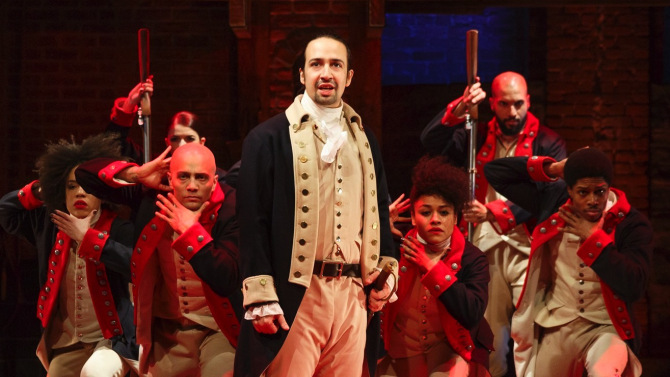
A Broadway musical that uses hip hop to tell the story of one of America’s founding fathers? At first glance it sounds like a School House Rock music video that tries to make learning history “fun” for the younger kids. However, Lin-Manuel Miranda’s musical creation, Hamilton, has come to define a cultural moment in American history, as many musicals have done in the past. Hamilton is part of a long and rich legacy of American musical theatre and its seemingly constant need to answer the questions “Who is American?” and “What is America?” Musical theatre scholar and historian Raymond Knapp says, “American musicals become, in part and in some form, enacted demonstrations of Americanism, and often take on a formative, defining role in the construction of a collective sense of ‘America.'” 1 Hamilton opened more than a year ago, and this article explores the intentional and unintentional relevance of the revolutionary musical in the twilight of the Obama administration and the dawn of the Trump era, and the conventions and tactics it has adopted.
Please Note: The topics that relate to this musical are vast and cannot be covered by a single article. If you have any further insights (especially on the new Hamilton Mixtape), do not hesitate to share it in the comments section!
The Ten Dollar Founding Father
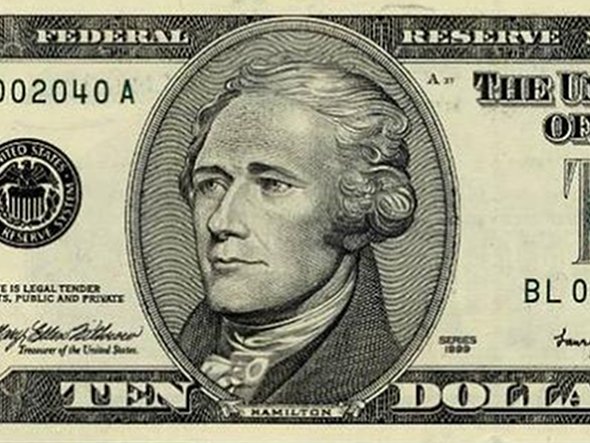
In every election season, there is much talk of the founding fathers and what they would or would not stand for if they were alive today. This process of speculation mythologizes these men and glorifies them into paragons of (read: Christian) virtue. 2 In addition to modern-day political rhetoric, the many representations of America’s founding fathers in art portray them as almost god-like beings: brave, poised, strong, and intelligent. Any sense of doubt, fear, or fallibility that these men may have experienced often gets lost along with other dirty details: many of these men owned slaves, they drank a lot, some smoked a lot of hemp (among other drugs), they had several mistresses, and they made a lot of mistakes (personal and otherwise) as they shaped a new nation and changed the course of history. 3 If anything, our founding fathers were ordinary men who did extraordinary things.
Alexander Hamilton, however, is unique in that he had nearly every disadvantage a person could have had stacked against him when he boarded a ship for New York City. Born in the Caribbean to unwed parents, he was denied education because of his “illegitimate” status. He became a self-educated clerk and after a hurricane destroyed the town of Christiansted, he wrote an essay describing the destruction. The community was so moved by his writing that they gathered a collection to pay for his passage on a ship to the Thirteen Colonies to continue his education. He was a student at King’s College (Columbia University) when the American Revolution began. In those days, war provided opportunities for men to rise above their station. Already an avid “patriot,” Hamilton joined a militia and rose to the rank of captain, eventually being recommended for George Washington’s staff. Still believing that his place was on the field, he threatened to quit if Washington did not give him a field command. Hamilton was assigned to lead three infantry battalions in the Battle of Yorktown which was the definitive final standoff between British and American troops.

After the war, the central conflict of the formation of a new nation was the question of whether power should reside in the federal or state governments. Many feared that a strong federal government would be too powerful, like having a monarch, while others feared that a weak federal government would leave the new states decentralized and vulnerable. Hamilton found himself in the later group and worked to create a strong central government. When it seemed that the Constitution would never become a reality, he helped pen the Federalist Papers, a series of essays defending the Constitution allowing for the popular support needed to ratify it. Hamilton became the first Secretary of Treasury in the new United States of America and founded the US Mint, a national bank, and the US Coast Guard.
It was during this time that he made many enemies among his fellow founding fathers including Thomas Jefferson, James Madison, John Adams and many others because of political differences. Hamilton’s life was also shaken by scandal when news of his extramarital affair with Mary Reynolds became public and with the death of his first born son Phillip in a duel.
When the presidential election of 1800 ended in an electoral tie between Aaron Burr and Thomas Jefferson, Hamilton was instrumental in securing the presidency for Jefferson even though they were opposed ideologically. Hamilton believed that Burr was morally unfit to be president and Burr, insulted by Hamilton’s attacks, challenged him to a duel. In those days, duels were matters of honor and gentlemen would often fire their shot in the air (it was enough just to show up). However, because Hamilton was wearing his glasses, Burr believed that Hamilton would actually shoot to kill. Burr fatally shot Hamilton after Hamilton had nobly fired in the air. Hamilton died the next day.
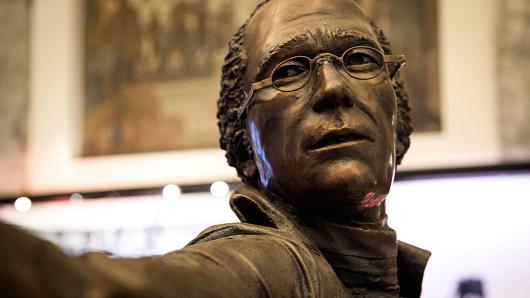
This story is naturally dramatic and when Lin-Manuel Miranda read the 600 page biography of Hamilton by Ron Chernow, he thought, “Somebody’s already made this into a musical. How can anyone not have made this into a musical?” 4 Miranda recognized not only the theatrical potential of the story of Hamilton’s life, but as an avid musical theatre fan, himself, Miranda recognized that the underdog story of a man who embodies American values would be perfectly translatable into the American musical theatre structure because of the way American musical theatre and hip-hop embodies national values.
I Wrote My Way Out

As stated above, the lives of the founding fathers have been mythologized. Their vices, their shortcomings, their doubts, and scandals hardly ever make their way into America’s national narrative. This lack of nuance makes these figures “larger than life” in the American consciousness, affecting not only which parts of the story get told, but who is included in this story and how the story gets told. One of the major themes in Hamilton is the telling of history itself. Songs like “History Has its Eyes on You” and “Who Lives Who Dies Who Tells Your Story” address this along with their many reprises.
To say that something is a “myth” is not to imply that it is a false or made-up story. The “American Dream,” for example, is an American national myth as a combination of historical examples of men and women who have risen above their station and achieved greatness based on the American ideals of individualism and self-determination. As Knapp says, “In adapting the European model of nationalism to their own circumstances, Americans constructed their own national myth of origins, where a European immigrant population and its descendants tamed a rugged American landscape, conceiving and instituting a cultural and political environment of individual self-determination.” 5
In 2009 when Miranda was invited to the White House Poetry Slam, he proclaimed in front of President Obama and other prominent statesmen: “I’m actually working on a hip-hop album… about the life of someone who I think embodies hip-hop: Treasury Secretary, Alexander Hamilton.” This announcement was met with laughter, but Miranda went on to defend himself saying, “You laugh, but it’s true… he was born a penniless orphan, in St. Croix [in the Caribbean],… became George Washington’s right hand man, … became Treasury Secretary, caught beef with every other Founding Father, and all on the strength of his writing. I think he embodies the Word’s ability to make a difference.” Then Miranda nervously began to sing the lyrics to what would eventually become the first song in his hit new musical.
It all begins with a question:
“How does a bastard, orphan, son of a whore and a
Scotsman, dropped in the middle of a forgotten
Spot in the Caribbean by Providence, impoverished, in squalor
Grow up to be a hero and a scholar?“
The musical, itself, does more than answer this question. Miranda is able to distill decades of events and hundreds of years of historical analysis through different contemporary music styles, multicultural, cross-racial casting, and traditional musical theatre conventions, into a two act Broadway show which presents America’s founding for a 21st Century audience in a way that is profound. While not the first hip-hop musical, the style is appropriate for the story of Alexander Hamilton because as Lin says, “The hip-hop narrative is writing yourself out of your circumstances” just like Hamilton who sings the song “Hurricane” in Act II about the essay he wrote which inspired people to send him to school in the American colonies. 6 The marriage of the two makes sense. Beyond the fact that these are two genres of performance created in America, they are both steeped in American values such as self-determination.
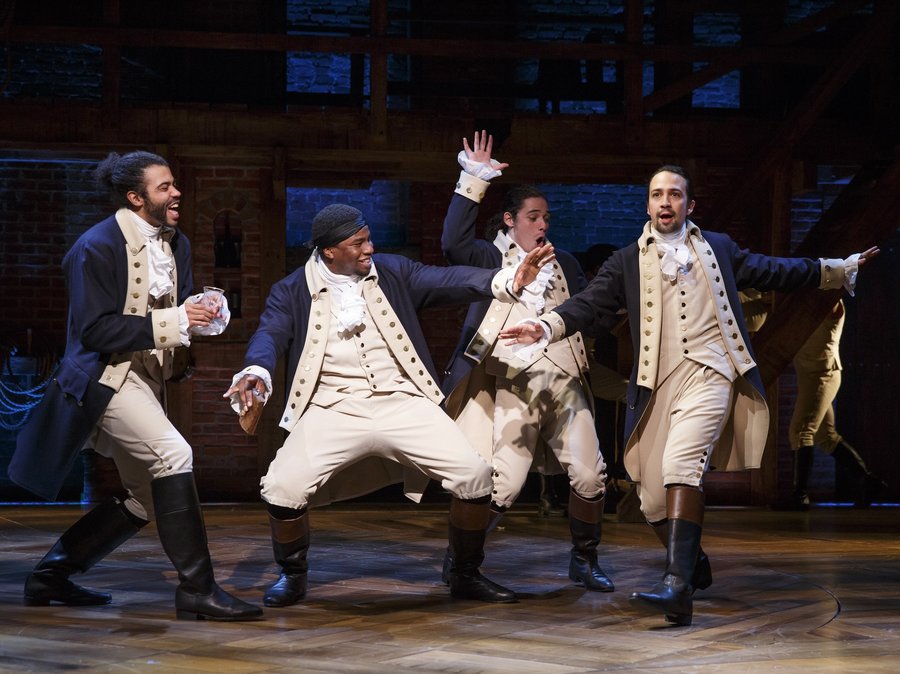
Musical theatre includes many conventions; among them, the “I Want” song. This is a song, usually placed early in the show, in which the protagonist exclaims his or her objectives. In Hamilton, the “I Want” song is “My Shot” where Hamilton and his friends all sing about their dreams. Miranda claims, “All of my favorite hip-hop songs are all really good musical theatre “I Want” songs.” The musical’s emphasis on myth and the telling of history hearkens to the way in which a large part of hip-hop culture is the building up of a star persona which is in many ways “larger than life” and the creation of each artist’s own individual myth.
Hip-hop is also a genre that actively calls for social change. It a revolutionary style which calls for revolutions. Hamilton is not the first hip-hop musical or even the first successful hip-hop musical. Lin-Manuel Miranda’s 2008 hip-hop musical, In the Heights, won the Tony Award for Best Musical and was met with much acclaim. The mega-success of Hamilton goes beyond the use of a popular music genre like hip-hop. The most revolutionary aspect of the musical, therefore, is not the hip-hop, but the cross-racial casting of America’s founding fathers by actors of color. “This is the story of America-then told by America-now,” said Lin when the show was still playing Off-Broadway. By telling the story of one of America’s founding fathers though the style of hip-hop and with actors of color, Miranda reclaims American history, musical theatre’s American heritage, and the implied “American Dream” as belonging to all Americans.
Hamilton not only includes a title character who embodies the ‘American Dream’ and other shared values, it is the culmination of the American cultural heritage which musical theatre embodies; a culture which Miranda is very much aware of, being an avid musical theatre fan himself. 7 .
Musical Theatre and the Formation of National Identity
Hamilton may use hip-hop as a vehicle to tell the story of America, but don’t be fooled. It is 100% the descendant of musical theatre traditions. The story of musical theatre begins around the time of Alexander Hamilton. After the founding of America, many people of the new nation felt culturally inferior to their European parents. To this day, Europe is believed to be culturally superior by many; however, to assert cultural superiority of Europe over America is to compare apples and oranges. American cultural tastes have been shaped by uniquely American experiences; thus, not a lack of culture, but a different culture which is often embodied in the form and style of American musicals.
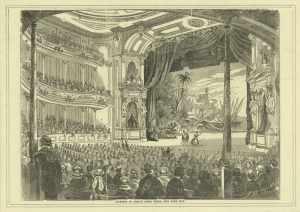
It took nearly a century for America to create its own cultural voice. Many historians point to the Civil War as the defining event which led to a definitive sense of Americanism. Importantly, the first American “musical” premiered in New York not long after the end of this war. The Black Crook was an American adaptation of a German and French fairy tale musical revue complete with a plot, musical numbers, and ballet. However, where the characters in the original German version had their lives affected by outside forces such as divine providence, the American version gave more agency and self-sufficiency to their characters; infusing the plot with American virtues and supplementing it with a spectacle like the country had never seen before. The American Musical was born. Knapp describes the way in which the birth of American musical theatre coincided with the birth of American nationalism:
“The specific task of reunification in the recently re-United States, along with Western expansion, the approaching Centennial celebration, and the rise of nationalist ideologies in Europe during the second half of the nineteenth century- all served to heighten the need to define and refine what precisely it meant to be American. Musicals eventually proved to be a particularly effective place to do that, since what happened on stage not only brought a specific audience together within a constructed community, but also sent that audience out into a larger community armed with songs to be shared, providing at least some basis for achieving a sense of unity among the increasingly varied people of a country expanding rampantly both geographically and through immigration.” 8
It was around this time (the late nineteenth century) that nationalism was becoming prevalent in European countries. As Knapp defines nationalism, “The alignments proposed within nationalist ideologies specified who belonged to a particular land… and who did not belong.” 9 Americans, however, realizing that they and their families originated somewhere else, did not have the same claim to the land and tied their sense of nationhood to ideals instead of Old World entitlements. Early incarnations of musical theatre such as Gilbert and Sullivan’s operetta
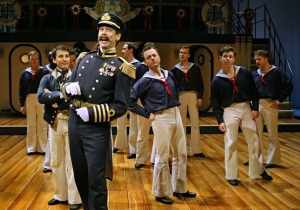
H.M.S. Pinafore were popular in the U.S. because they parodied Old World behaviors and philosophies. This signaled American citizens being able to separate their identity from their European origins. 10 From the late 19th Century on, musicals have carried on the tradition of uniting American communities by “defining and refining” American identity as it pertains to each cultural moment.
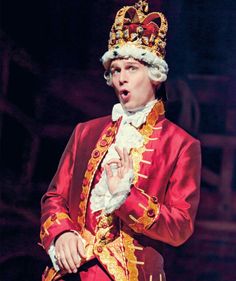
These American traditions. going all the way back to the 19th Century, are represented in Hamilton. One reference to Gilbert and Sullivan is quite obvious in George Washington’s song “Right Hand Man” when he sings: “Now I’m the model of a modern major-general” in reference to the “Major General Song” in The Pirates of Penzance. Another more subtle link is the character King George III, who is set apart by his over-the-top British-ness both musically (his song “You’ll Be Back” is a break-up song to the Colonies in the style of British pop, sharing similar chords to certain Beatles’ songs, and carrying the style of Elton John or David Bowie) and though the flamboyant performance of actor Johnathan Groff. Groff’s performance is similar to the lampooning of British masculinity (or a lack, thereof) present in Gilbert and Sullivan numbers such as “I am the Captain of the Pinafore” and the “Major-General Song.” Note the similarities of presentation in the pictures of King George and Captain Corcoran. The fact that Johnathan Groff is openly gay also adds to the tradition of gay sensibilities and “camp” in American musical theatre, going back to the gay subtexts and homoeroticism of Gilbert and Sullivan all-male choruses. 11
One more evident aspect of King George in Hamilton which sets him apart is the fact that in a multicultural, cross-racially cast history, King George remains Caucasian, connecting whiteness to colonialism, power, privilege, and performance. In the tradition of Gilbert and Sullivan where the British represented the “Old World”, to tie whiteness to Britishness and “Old World” racially and economically motivated imperialism makes a strong statement in a nation who is still reeling from the War in Iraq and asking itself questions on globalization and foreign intervention, which were defining issues in the 2016 presidential election. The “New Nationalism” of the 2010s is characterized by nativism, anti-globalization, protectivism, anti-immigration, and ties to the newly mainstreamed “Alt-Right” with its associations to white nationalism, white supremacy, and (appropriately) neo-monarchism. 12

As far as internet trolls who claim to be “Alt-Right” for the “lulz” go, their own “Troll King” or “King of Trolls,” as he has been labeled, Milo Yiannopoulos is very similar to Hamilton’s King George with his British accent, over-the-top performances of queerness and whiteness, and verbal brutality. This, of course, was not originally intended as a parallel for the character, but it is one of the many “happy accidents” of this musical which place it in a specific cultural moment. The members of this “other” “Alt-Right” are known for their confrontational shock value and love of watching chaos unfold. This is similar to King George in Act II who revels in the dawning contention of the Adams administration with the line “They will tear each other into pieces. Jesus Christ this will be fun!” The message in Hamilton is clear, however, to leave the “Old World” behind. With each changing cultural moment in the 20th Century, American musical theatre has adapted and the form and conventions, themselves, have reflected the changing nation. Just as America in 2015-2016 is one of these pivotal moments, so too does the structure and form of Hamilton bear the mark of each of these changes like the rings inside a tree.
Immigrants. We Get the Job Done 13
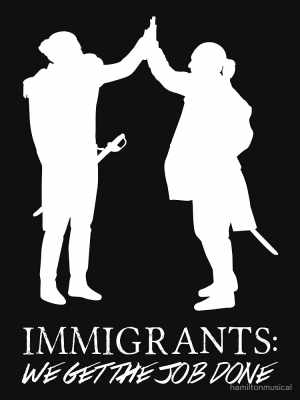 If one of the negatives of myth is that it eliminates the more unsavory parts of the story, the plus-side of such myths is that the oversimplification of history creates a more inclusive narrative. The omission of doubt and struggle from the story or the absence of factors such as racism, creates a narrative that anyone can be considered American if one embodies American values.
If one of the negatives of myth is that it eliminates the more unsavory parts of the story, the plus-side of such myths is that the oversimplification of history creates a more inclusive narrative. The omission of doubt and struggle from the story or the absence of factors such as racism, creates a narrative that anyone can be considered American if one embodies American values.
It was this inclusiveness which compelled Jewish and Irish immigrants and children of immigrants in the early 1900s to create popular American music and shows in a district of New York City called Tin Pan Alley which would eventually become “Broadway.” Their music blended the traditional styles of their homeland with contemporary American classical music and jazz, and American slang lyrics to create popular songs which spoke to an idealized America. A Russian Jewish immigrant named Irving Berlin created some of the most iconic patriotic music in America including the song “God Bless America.” Thus, immigration, themes of outsiders overcoming obstacles, the “American Dream”, and some of the most patriotic visions of America have always been entwined in the Broadway musical form as they are in Hamilton.
Eventually, this blended style of popular music and staging coalesced into a form most recognized now as the “book-musical” structure where dialogue is interrupted by songs which advance the plot or character development. Show Boat (1927), Oklahoma (1942), South Pacific (1949), and The Sound of Music (1959) are some of the most famous book-musicals, which are often considered to be somewhat saccharine and frivolous because of their use of more mythologized, idyllic settings and plot-lines. However, each one deals with serious social issues of the time including domestic abuse, gambling, interracial marriages (in a time when they were illegal), racism, and the power of one during the rise of extremism. These musicals were each a product of their own cultural moment in times of uncertainty, war, and unrest.
While Hamilton doesn’t follow the “book-musical” format, it does use American mythology to address social issues, particularly those pertaining to immigration with its unabashed pro-immigrant stance and lines borrowed from the musicals listed above such as “You’ve got to be carefully taught” which alludes to the anti-racism anthem in South Pacific of the same name. While past musicals have tackled the issue of immigration such as West Side Story (1957), Fiddler on the Roof (1964), and Ragtime (1998), among others, Hamilton puts the issue in stark terms: without immigrants, America might not have existed at all.
Alexander Hamilton is not the only “immigrant coming up from the bottom” in the musical. As the first act teaches the audience, “Turns out we have a secret weapon!/ An immigrant you know and love who’s unafraid to step in!” referring to the Marquis de Lafayette who fought with the Americans in the Revolution and was a key figure at several pivotal battles. While he never returned to America after the War, he was granted citizenship by several states, and Maryland went so far as to declare him and all of his male descendents as naturalized citizens for his service. 14 The story of Hamilton and Lafayette is part of the same thread as all of those immigrants who created musical theatre and helped to shape American cultural identity just as Hamilton shaped our financial system. Immigrants such as these created America from their own imagination, and not from what already existed, integrating their identity, blood, sweat, and tears, with American ideals.
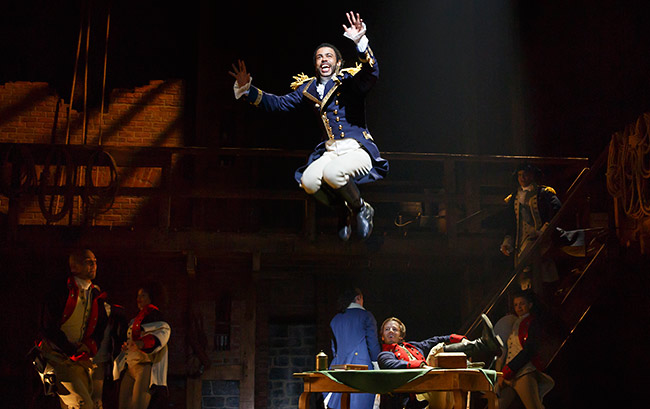
They key word here is “integration” not to be confused with “assimilation.” To integrate is to blend together and to assimilate is to become something else entirely. Of course, the very composition of the musical integrates hip-hop and musical theatre conventions and traditions, integrates actors of color and the founding fathers, and integrates modern politics with early American politics. The immigrants in Hamilton like Lafayette integrate themselves into the dominant American culture without compromising their identity. This is evident in the fact that Lafayette is dressed in a different uniform and speaks both French and English throughout his time on stage. While he holds on to his identity, he does integrate himself in the culture of his “revolutionary set.” As Miranda notes, at the beginning of Act I, his English is not as strong. He raps in mostly French in “Aaron Burr, Sir” and has to ask “how you say?” in “My Shot.” By the end of Act I, however, he is given the fastest rap in the show in “Guns and Ships”, according to Miranda when he raps, “I’m taking this horse by the reigns, making redcoats redder with blood stains.” 15 In this way Hamilton traces Lafayette’s arc of integration. These details are significant to understanding Hamilton’s place in the current cultural moment. On the same night that Hamilton opened on Broadway, Governor Bobby Jindal claimed that “Immigration without assimilation is invasion” in the first Republican primaries debate. 16 Miranda nuances the differences between integration and assimilation though Lafayette, while his character arc and the entire narrative of immigrants and Broadway prove that many immigrants in American history did not assimilate: much to the overall benefit of the nation.
Counter-mythologies and the Obama Years
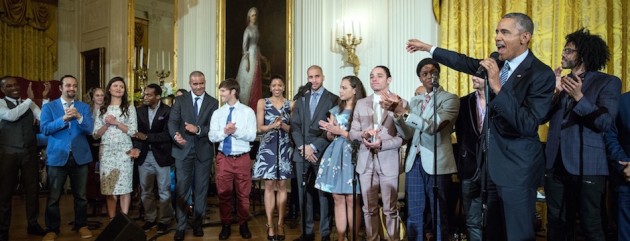
As the 20th Century rolled along, and social change movements became more prominent, the problems of the nation could no longer be hidden by myth-centered musicals. Counter-mythologies became popular in the 1960s with the Civil Rights Movement and other counter-cultural movements at the time informing American culture. These movements brought the needs and experiences of people on the fringe of society and brought them to the forefront of American consciousness. Likewise Broadway musicals like Hair, Cabaret, and Sweeney Todd took a look at the freaks and criminals of the world in the late 60s and early 70s while musicals like Company, Into the Woods, and Assassins questioned things like heterosexual marriage, “Happily Ever After” and the “American Dream.” Counter-mythologies accomplish this by extracting the lesser known characters or villains and making them the main focus. They take the unsavory parts of the story and put them in the forefront.
Alexander Hamilton, although he is featured on the ten dollar bill, is one of the lesser known founding fathers. Thomas Kail, the director of Hamilton, describes the founding father “like the B-side of the founding fathers, the deep cut on the album that the really hard-core fan knows about.” 17 The lyrics to the final song of the musical address the counter-mythological side to telling Hamilton’s story:
[ANGELICA]
Every other founding father’s story gets told
Every other founding father gets to grow old[BURR]
But when you’re gone, who remembers your name?
Who keeps your flame?[BURR AND MEN]
Who tells your story?Who tells your story?
[ANGELICA AND WOMEN]
Who tells your story?
Your story?[WOMEN]
Eliza[ELIZA]
I put myself back in the narrative
One may notice that I did not mention Hamilton’s wife Eliza in his life story above. The wives of founding fathers, let alone their extra-marital affairs are usually not present in the history books. Even on Wikipedia, the “Personal Life” of an important figure is usually placed at the end or in the footnotes. This is how myth is manifested in contemporary times. The musical, however, not only focuses on the characters omitted from the history books, but includes less than flattering facts about them: the womanizing, the slave owning, hemp-smoking details.
The 2016 presidential election exposed the conflict America has of reconciling their ideal presidential candidates with their personal flaws and political pragmatism. Hamilton reminds us that long before Donald Trump grabbed any woman, the powerful men of this country “deflowered” many a woman in the song “Winter’s Ball.” It reminds us that before Bernie Sanders spoke out against corruption in government, that “corruption’s such an old song, we can sing along in harmony.” Before Barack Obama and Hillary Clinton were involved in unpopular deals or compromises, Alexander Hamilton and Thomas Jefferson solved their differences behind closed doors, proving that ideological purity never existed in American politics and that the key to democracy is “the art of the compromise.”
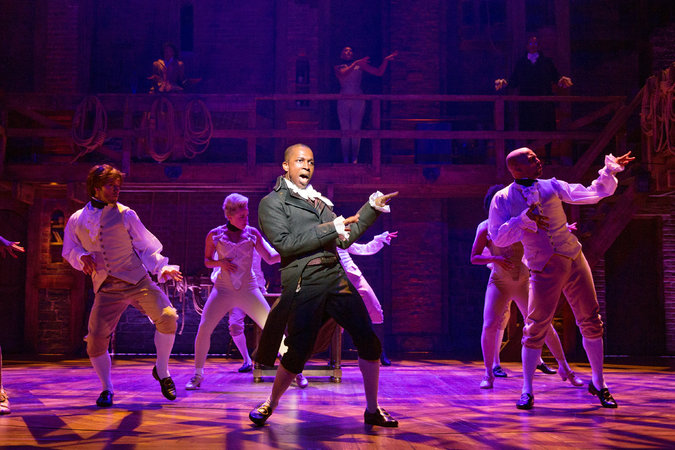
This balance between myth and counter-myth has been definitive of the Obama administration which has been characterized by the contrast between the promises of “Hope and Change” that were made and the slow, grueling process of fighting congressional gridlock and compromising. This frustration is voiced by the narrator Aaron Burr in the song “The Room Where it Happens”:
[COMPANY]
The art of the compromise—[BURR]
Hold your nose and close your eyes[COMPANY]
We want our leaders to save the day—[BURR]
But we don’t get a say in what they trade away[COMPANY]
We dream of a brand new start—[BURR]
But we dream in the dark for the most part[BURR AND COMPANY]
Dark as a tomb where it happens[BURR]
I’ve got to be in
The room where it happens.
Burr’s lines are cynical, and Burr’s cynicism not only reflects modern frustrations onto American history, but counteracts Hamilton’s optimism and idealism. Because of the rise of cable news networks like Fox and MSNBC, Americans are used to getting their information through the lens of another. As Burr is eventually the one who kills Alexander, he is Hamilton’s nemesis. The fact that the protagonist’s nemesis is narrating the musical is another aspect of counter-myth as the audience receives the myth though the critical lens of the “villain.”
This is, like many aspects of Hamilton, part of the legacy of musicals in American culture. There is no Hamilton, without a musical like Andrew Lloyd Webber’s Jesus Christ Superstar, which features the story of Jesus Christ as told by Judas Iscariot who sings, “If you strip away/ the myth from the man/ you will see/ where we all/ soon will be.” Lloyd Webber’s next musical Evita followed the same format with the life story of the first lady of Argentina as told by revolutionary Che Guevara who opens the show by asking “Who is this Santa Evita?” Each narrator dissects and analyzes the myth as it unfolds, and Hamilton also follows the same “rock opera” format, beginning its life as a concept album. While Lloyd Webber is British, the musicals have been adopted by American audiences because of the ways in which they reinforced American values.
This storytelling style offers the benefit of nuance to a part of American history which is often oversimplified, but often invoked. Through Hamilton, Lin-Manuel Miranda has given the American people a way of reflecting on their circumstances, and a shared voice with which to express themselves. It is the inheritance of a rich and complex American performance tradition which praises individual self-determination and the “American Dream” while acknowledging the contradictions and challenges of practicing such ideals. The full title of the show is Hamilton: An American Musical, and it is: in every possible way.
Works Cited
- Knapp, Raymond. The American Musical and the Formation of National Identity. Princeton and Oxford: Princeton University Press. 2005. pg. 103 ↩
- This trend is present on both sides of the political spectrum and also used by third and fourth party advocates, as well ↩
- Of course, there are exceptions to these sanitized portrayals in the form of documentaries, bio-pics, and miniseries. Hamilton is certainly not the first piece of pop culture to defy the myth of the founding fathers. Though, unless one actively studies history and watches documentaries like those made by Ken Burns (which, although they mention the flaws of founding fathers such as Thomas Jefferson, still romanticize his myth) mainstream films and TV series on the subject rarely go out of their way to nuance their lives. ↩
- Lin-Manuel Miranda Interview. “‘Hamilton’: A founding father takes to the stage.” CBS Sunday Morning. Youtube.com. Web. Feb 12, 2016. ↩
- Knapp, 228 ↩
- CBS ↩
- In an interview with 60 Minutes, Miranda talked about his vast collection of musical theatre cast albums and his love of even classic musicals like Camelot. CBS News. Nov. 8, 2015. Web. March 22, 2016. ↩
- Knapp, 8 ↩
- Knapp, 119 ↩
- Knapp, 8 ↩
- Knapp, 7 ↩
- It is often difficult to characterize and define the “Alt-Right” lately, which is why I allude to “associations” with white supremacy, nationalism, and neo-monarchism. There are factions which identify themselves as “Alt-Right” who may adhere to one, all, or none of these credos. ↩
- This line comes from the song “Yorktown” in Act I and was applauded at the 70th Annual Tony Awards for its political potency. The Tony Performance of “Yorktown” exemplifies the way in which Hamilton stays current. The Tonys were the night after teh deadly Orlando Pulse Nightclub mass shooting, and out of respect, the cast chose to eliminate the prop rifles from their performance that evening. https://www.youtube.com/watch?v=b5VqyCQV1Tg ↩
- Ayme, Elizabeth. “Guns and Ships.” Hamilton. www.genius.com ↩
- “Lin Manuel Miranda interview” The Late Show. Youtube.com Dec 12, 2015. https://www.youtube.com/watch?v=h7YTPuEMgaE&t=321s ↩
- This timing was brought to my attention by the article “Race, Immigration, and Hamilton: The Relevance of Lin-Manuel Miranda’s New Musical” by Kendra James on Toast. ↩
- Auld, Tim. “Hamilton: The Broadway phenomenon that made US history hip.” The Telegraph. Dec 30, 2015. Web. March 27, 2016. ↩
What do you think? Leave a comment.






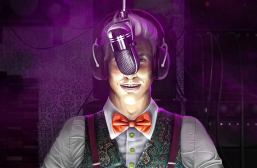

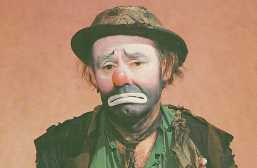


Totally recommend listening to the soundtrack. It really is an extraordinary work, complex both in historical detail and in emotional nuance.
We have listened to it several times, and it is quite something. It’s entertaining, and it also doesn’t exactly pull punches about the relationship between Hamilton and his wife, and his affair. My husband has never been inclined to listen to hip-hop or rap, but I told him to try it, it wasn’t exactly what he would be expecting. Not only does he sing along, he now throws random Hamilton quotes into other things.
I don’t think I’ve ever listened to a soundtrack so much in my life – the score is absolutely mind-blowing. I really can’t get my head around it.
Really good writeup. I’ve not seen the musical, only a few snippets here and there on TV. It doesn’t really look like my thing. If I go staged musical events, I tend to prefer more “traditional” opera (though up to contemporary works). That written, I do rather like how Mr Miranda has handled his immense success. In the couple interviews I’ve seen, he comes off well, articulate and creative and without an axe to grind. What he’s really like, I don’t know, but so far, publicly, he hasn’t made a misstep that I can see, and can only admire his success and hope he continues.
Glad to hear musical theatre is recovering from its long dearth.
I’m not sure which dearth you are referring to. There has never been a real musical theatre deficit in the US.
Lin-Manuel Miranda is a hero. The best of America.
And bravo to his cast for engaging Pence.
This article brought to mind so many different aspects of American history and how (half of) the nation is dealing with the close of the Obama Administration. Even in the establishing times of the U.S. plays such as Royall Tyler’s “The Contrast” worked to define what being American truly meant.
I think another really important lesson that Hamilton is working to teach its audience is how to let go of the Obamas. George Washington is bid farewell in a very emotional way, which has proved to be consistent with the emotions of the retiring Obama Administration.
Hamilton is a decent musical. It’s groundbreaking in its use of hip-hop and its casting, but it’s simply a decent musical. As a student of history, I appreciate a historical musical based in fact, but there are some inaccuracies that people will consider true because Hamilton bills itself as accurate (no, I will not list them).
I already know what they are, but thanks. Every musical ever written about a historic figure takes liberties. American musicals will usually choose theme, plot, and character over accuracy.
I’ve been lucky enough to see the show twice and it was worth every penny and deserves every nomination. Fantastic musical.
Great piece. Hundreds of thousands – if not millions – of people worldwide have become fans of Hamilton… This includes people who normally wouldn’t look twice at music theatre. It’s been feted with prizes and universal acclaim.
I love this. Shared with friends and family. For those of you thinking ‘it’s not my thing’, well, if you care about history and human beings, any you’re a little open-minded, you might well surprise yourself and find that it is
hamilton must certainly be taken with a grain of salt and research. lin-manuel miranda took so much poetic licence it could be it’s own hollywood adaptation.
I am an avid reader, and I turn to books before I turn to movies or TV shows for entertainment. If I read a book and something is mentioned and it triggers my curiosity, I will go searching for reading material on that subject. Movies and TV shows have the same exact potential; Mr. Miranda never claimed to have made a documentary about Hamilton. He took a work of non-fiction (a comprehensive one) and adapted it to make it more accessible to people who wouldn’t otherwise give a rat’s whiskers about Alexander Hamilton.
Most people didn’t even know Hamilton’s face was on the $10 bill. You cannot dismiss the impact Mr. Miranda’s work has had.
It’s a musical, not an academic work. Artistic license is a good thing.
Hamilton is a work of genius.
Shakespeare meets hip-hop.
Hamilton is PHENOMENAL.
I’m going to be honest, I didn’t think Hamilton was that good. The music was ok, and it worked, but I felt it went on a little too long, wasn’t catchy, was slightly repetitive.
Any historian does not like the show is free to write something better and try to sell it to a producer.
Black Art has been expressing itself throughout Americas racist past.
I’m interested, want to say more? 🙂
This was a well constructed and relevant piece of arts journalism.
I like how he managed to turn hip-hop (with its burden of sexism and homophobia) on its head and put it in service of a message of tolerance.
Most genres of music have problems with sexism and homophobia, even if the language used is different; there’s a lot more to hip-hop than that.
This show is very sexist; the mania over this misstatement of this history has indeed obscured that the reason the US dollar has such strength has been the role of gender equality in our Constitution.
Is the show feminist? Not really. But I wouldn’t call it “very sexist” either. That’s just not the case.
I’m not entirely sure what you’re rambling about here…
I’ve had the Hamilton soundtrack playing in my car for months. It really is a fantastic musical where the hype is well justified.
ME TOO! I had the Hamilton CD on repeat in my car for a month straight. It deserves to be in the top 10 albums for 2016. So much awful news that year but Hamilton and Lin-Manuel Miranda have been two of the bright spots.
Hamilton as a result of its success has resulted in the producers being some of the greediest theatre impresarios of all time, with seat prices at the most exorbitant ever.
This often happens with successful shows, and has been the case since the 1980s. Hamilton is not unique in this. Keep in mind that Book of Mormon seats were about the same price.
They also have the lottery system, with performers interacting with those waiting to enter, and give seats out discounted to all NY state public schools!
This is not a musical-it is a fad. Every so often nowadays Broadway ( which has become so bankrupt of ideas that it simply mines the latest Hollywood hits or past classics) does still come up with an original idea.Producing a show about the life of a great American politician was one. Unfortunately, besides having a paucity of inspiration it also lacks composing talent.
This is hardly surprising since the entire music industry is stricken with a serious inability to produce tunes, melodies, songs that stick in one’s head. We live in mediocre times and this is particularly true of the art form known as musical theatre.
No, it is definitely a musical. As you will notice from the long and detailed article I have written (which I don’t believe you actually read or maybe you should read again) this musical draws from several musical theatre traditions and the popularity of which goes beyond it’s “originality”
Hamilton is a very meta construction. Give it some time, absorb a bit more background and you might be surprised.
Really nice work, thanks for the writeup.
Great article on one of the best musicals of all time. Lin is a creative genius who continues to impress me with his works, most recently in Moana. I liked that you weaved in some American musical history. If you haven’t already, you should check out Hamilton: The Revolution. It’s a behind-the-scenes book by Lin with all of his notes on each of the songs from the musical.
It is on my list! Thank you! and thank you for the kind words!
I saw Lin in the Broadway corridor in NYC and shrieked like a school girl; a similar shriek escaped yet, not so vocal when I saw your article. Your writing style is very is fantastic easy to follow and comprehend. I enjoy the push and pull of comparative musicals with regards to society past and current. Moreover, I am grateful that your article is the Featured article; your work is reflective of a more diverse audience whose interests go far beyond Disney realms.
Thank you so much! I’m so glad you liked it! It was a year in the making, so it’s nice to have it mean a lot to people.
Article is very thought out. Hamilton does in a way reflect the problems facing America today.
Sorry. I found the blandness and repetitiveness of the entire show with some really out of tune singing of “music” that sounded like badly sung operatic recitative simply awful. It’s overhyped zeitgeist narrative hit the big time because of the laudable material and it’s very popular ….. but this audience member didn’t like it. I know that’s very unpopular and “unhip” to make this comment but it’s my opinion.
I find it really interesting that this musical became so popular at, as you put it, the “twilight of the Obama administration and the dawn of the Trump Era.” It has some interesting intersectionality with current events–not only in the form of its content, but I’m sure we all remember when Mike Pence went to see a performance of Hamilton and was directly addressed from the stage (there were some boos from the audience, but I thought the address itself was quite well-mannered and tempered). Lin Manuel-Miranda has proven himself to be quite the musical talent with this piece, but until reading this piece I had no idea the extent to which he had captured the authentic American spirit in it. Listening to the album, it seems, will not be enough–I must find some way to see Hamilton before it ends.
After seeing that Lin Manuel-Miranda wrote music for Moana, is engaged to produce “The Kingkiller Chronicle” television series, and having heard pieces of his writing on Last Week Tonight and The West Wing Weekly, I am even more interested in seeing his (perhaps) magnum opus, Hamilton.
Beautiful article about a powerful musical! Both thought provoking and enjoyable. Art inspiring art.
“This is story of America-then told by America-now.” Fantastic quote choice from the great Lin Manuel-Miranda, and really sums up what this musical is all about . . . absolutely amazing article, thanks for your brilliance, once more!
Thanks Betts! Can’t wait to read yours on Lucy!
What an insightful article! Very powerful and informative.
The best part about Hamilton is that it has so much social commentary on how we view our political system. While it is a beautiful show – the values and commentary provided dives so much deeper. This piece shows that quite clearly and I love it’s approach to modern day patriotism.
Great work, Christen!
Thank you! I’m glad you enjoyed it!
Hamilton is one of those musicals that will define an era of theatre, an era that I hope will be full of diversity and innovation. I hope that this kind of theatre, the kind of theatre that sparks discussions and highlights parallels in our present lives, continues to grow and evolve.
The section on immigrants in this article, namely integration versus assimilation, is entirely relevant to what we see in our country today. It is common for African American women to straighten their natural hair to conform to American standards, and a common taunt to immigrants is “Learn to speak English”, even if they are speaking English(just not fluently). In these ways and other ways, we erase culture and contribute to immigrants’ feeling of shame for not being “American enough”, when our country is meant to celebrate diversity.
At the “dawn of the Trump era”, as you say, this musical is a testament to the willpower and importance of immigrants in our country. The words Brandon Dixon said to Mike Pence especially voice the opinions of immigrants under a Trump administration. Our nation was built on the backs of immigrants, and we should must keep reminding everyone how necessary it is to have a racially diverse America. Hopefully there will be more pieces in the future that will have the impact this show has had.
Great article! I felt like a learned a lot. I really appreciate Hamilton for it’s musical genius, but you’re right; it’s definitely a very relevant show for the current political climate in the US.
I agree with you that fictionalizing someone, paradoxically, can be a helpful and necessary way of de-mythologizing them. That’s a good point.
Thanks for this work! Your observation as well as the musical itself grows more poignant every day in this new time.
Thanks for writing and sharing 🙂 I live in Australia and we get a lot of second-hand pop culture from America, and other things along with that but without the cultural context. I’ve been meaning to see Hamilton or buy the album, this was the motivator I needed to actually go ahead and do it.
This is probably the most thorough analysis of what Hamilton stands for. You hit it right on the nail. This musical has encouraged a lot more people (including me) to seek a more nuanced understanding of our country’s history. I’m watching a showing in Chicago in 2 months. I really hope the cast is good!
This is probably the most thorough analysis of what Hamilton stands for I have read. You hit it right on the nail. This musical has encouraged a lot more people (including me) to seek a more nuanced understanding of our country’s history. I’m watching a showing in Chicago in 2 months. I really hope the cast is good!
What made the musical engrossing was the way it presented personality conflicts. Your essay highlights that these men were people not something on a higher level (in the sense the Magic Kingdom has the Hall of Presidents present, well, our Presidents). The focus on immigrants in this essay was good. No doubt many who sat in theaters and watched this musical must have been wondering how to look at the emphasis on immigrants in terms of the Trump Presidency policies on that topic. Tying in the musical with Trump and his policies, will probably lead to other essays doing the same thing–emphasizing the connection between this musical and the Trump Administration.
Excellently written article on the intricacies of Hamilton in America.
What Lin has done is weave into Hamilton his own zeitgeist of exposure – hip hop, The West Wing (television), West Side Story and his love of Sondheim, not to mention his love of NYC. When you read the Chernow book or listen as I just did in January – it is so clear how precious to this nation NYC is and how indeed Hamilton formed it every bit as much as he defended our Constitution AND he was in so many ways, JUST A MAN. Chernow drives his love of Ham and his understanding of humanity home in the book and I can feel how that settled in Lin. So in many ways, Lin represents a connectable feeling for what could be. Fans of the above immediately dream the same dream with him on all the levels. Lin is the center of the wheel as Hamilton and all that is possible emanates from there, we are all that powerful, we are all that able to write our way out and because of that, we fall deeply into the Hamilfam, the NYCfam, the Constitutionfam, theWWfam, the WSSfam, the hiphopfam – to change the world once again.
One subject that this article touches on which could be a topic in itself: the views that people had on George III. In Britain, in his time, he was seen as a model British monarch and citizen, as the first native-born monarch since Anne (and the first native-born king since Charles II), as a faithful husband (his court did not have much of the decadence and corruption (moral or otherwise) of his two predecessors, and had 13 children with his wife), and as an overall point of stability (he was king for nearly 60 years, and the longest-reigning king in British History). In many ways, much of his mythology in his own day resembles a male version of Victoria and Elizabeth II. This is a very different image of the American version of him (heavy-handed (with some truth; he didn’t like it when he felt there existed a disobedience and wanted such instances crushed)) and even modern Britain (largely forgotten beneath the shadows of Britain’s long-reigning queens).
Just some thoughts!